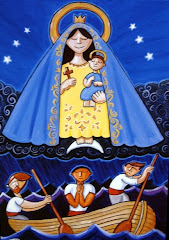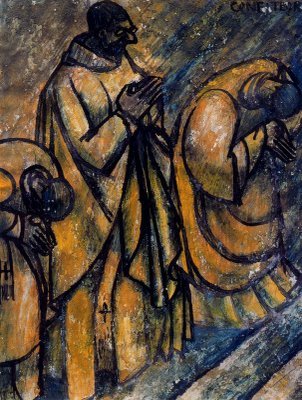
HOMILY OF POPE BENEDICT XVI
MASS OF THE FIFTH SUNDAY OF EASTER
YANKEE STADIUM,
20 APRIL 2008
Dear Brothers and Sisters in Christ,
In the Gospel we have just heard, Jesus tells his Apostles to put their faith in him, for he is "the way, and the truth and the life" (Jn 14:6). Christ is the way that leads to the Father, the truth which gives meaning to human existence, and the source of that life which is eternal joy with all the saints in his heavenly Kingdom. Let us take the Lord at his word! Let us renew our faith in him and put all our hope in his promises!
With this encouragement to persevere in the faith of Peter (cf. Lk 22:32; Mt 16:17), I greet all of you with great affection. I thank Cardinal Egan for his cordial words of welcome in your name. At this Mass, the Church in the
Our celebration today is also a sign of the impressive growth which God has given to the Church in your country in the past two hundred years. From a small flock like that described in the first reading, the Church in
This great accomplishment was not without its challenges. Today's first reading, taken from the Acts of the Apostles, speaks of linguistic and cultural tensions already present within the earliest Church community. At the same time, it shows the power of the word of God, authoritatively proclaimed by the Apostles and received in faith, to create a unity which transcends the divisions arising from human limitations and weakness. Here we are reminded of a fundamental truth: that the Church's unity has no other basis than the Word of God, made flesh in Christ Jesus our Lord. All external signs of identity, all structures, associations and programs, valuable or even essential as they may be, ultimately exist only to support and foster the deeper unity which, in Christ, is God's indefectible gift to his Church.
The first reading also makes clear, as we see from the imposition of hands on the first deacons, that the Church's unity is "apostolic". It is a visible unity, grounded in the Apostles whom Christ chose and appointed as witnesses to his resurrection, and it is born of what the Scriptures call "the obedience of faith" (Rom 1:5; cf. Acts 6:7).
"Authority" … "obedience". To be frank, these are not easy words to speak nowadays. Words like these represent a "stumbling stone" for many of our contemporaries, especially in a society which rightly places a high value on personal freedom. Yet, in the light of our faith in Jesus Christ - "the way and the truth and the life" - we come to see the fullest meaning, value, and indeed beauty, of those words. The Gospel teaches us that true freedom, the freedom of the children of God, is found only in the self-surrender which is part of the mystery of love. Only by losing ourselves, the Lord tells us, do we truly find ourselves (cf. Lk 17:33). True freedom blossoms when we turn away from the burden of sin, which clouds our perceptions and weakens our resolve, and find the source of our ultimate happiness in him who is infinite love, infinite freedom, infinite life. "In his will is our peace".
Real freedom, then, is God's gracious gift, the fruit of conversion to his truth, the truth which makes us free (cf. Jn 8:32). And this freedom in truth brings in its wake a new and liberating way of seeing reality. When we put on "the mind of Christ" (cf. Phil 2:5), new horizons open before us! In the light of faith, within the communion of the Church, we also find the inspiration and strength to become a leaven of the Gospel in the world. We become the light of the world, the salt of the earth (cf. Mt 5:13-14), entrusted with the "apostolate" of making our own lives, and the world in which we live, conform ever more fully to God's saving plan.
This magnificent vision of a world being transformed by the liberating truth of the Gospel is reflected in the description of the Church found in today's second reading. The Apostle tells us that Christ, risen from the dead, is the keystone of a great temple which is even now rising in the Spirit. And we, the members of his body, through Baptism have become "living stones" in that temple, sharing in the life of God by grace, blessed with the freedom of the sons of God, and empowered to offer spiritual sacrifices pleasing to him (cf. 1 Pet 2:5). And what is this offering which we are called to make, if not to direct our every thought, word and action to the truth of the Gospel and to harness all our energies in the service of God's Kingdom? Only in this way can we build with God, on the one foundation which is Christ (cf. 1 Cor 3:11). Only in this way can we build something that will truly endure. Only in this way can our lives find ultimate meaning and bear lasting fruit.
Today we recall the bicentennial of a watershed in the history of the Church in the
"You are a chosen race, a royal priesthood, a holy nation, a people he claims for his own, to proclaim his glorious works" (1 Pet 2:9). These words of the Apostle Peter do not simply remind us of the dignity which is ours by God's grace; they also challenge us to an ever greater fidelity to the glorious inheritance which we have received in Christ (cf. Eph 1:18). They challenge us to examine our consciences, to purify our hearts, to renew our baptismal commitment to reject Satan and all his empty promises. They challenge us to be a people of joy, heralds of the unfailing hope (cf. Rom 5:5) born of faith in God's word, and trust in his promises.
Each day, throughout this land, you and so many of your neighbors pray to the Father in the Lord's own words: "Thy Kingdom come". This prayer needs to shape the mind and heart of every Christian in this nation. It needs to bear fruit in the way you lead your lives and in the way you build up your families and your communities. It needs to create new "settings of hope" (cf. Spe Salvi, 32ff.) where God's Kingdom becomes present in all its saving power.
Praying fervently for the coming of the Kingdom also means being constantly alert for the signs of its presence, and working for its growth in every sector of society. It means facing the challenges of present and future with confidence in Christ's victory and a commitment to extending his reign. It means not losing heart in the face of resistance, adversity and scandal. It means overcoming every separation between faith and life, and countering false gospels of freedom and happiness. It also means rejecting a false dichotomy between faith and political life, since, as the Second Vatican Council put it, "there is no human activity - even in secular affairs - which can be withdrawn from God's dominion" (Lumen Gentium, 36). It means working to enrich American society and culture with the beauty and truth of the Gospel, and never losing sight of that great hope which gives meaning and value to all the other hopes which inspire our lives.
And this, dear friends, is the particular challenge which the Successor of Saint Peter sets before you today. As "a chosen people, a royal priesthood, a holy nation", follow faithfully in the footsteps of those who have gone before you! Hasten the coming of God's Kingdom in this land! Past generations have left you an impressive legacy. In our day too, the Catholic community in this nation has been outstanding in its prophetic witness in the defense of life, in the education of the young, in care for the poor, the sick and the stranger in your midst. On these solid foundations, the future of the Church in
Yesterday, not far from here, I was moved by the joy, the hope and the generous love of Christ which I saw on the faces of the many young people assembled in Dunwoodie. They are the Church's future, and they deserve all the prayer and support that you can give them. And so I wish to close by adding a special word of encouragement to them. My dear young friends, like the seven men, "filled with the Spirit and wisdom" whom the Apostles charged with care for the young Church, may you step forward and take up the responsibility which your faith in Christ sets before you! May you find the courage to proclaim Christ, "the same, yesterday, and today and for ever" and the unchanging truths which have their foundation in him (cf. Gaudium et Spes, 10; Heb 13:8). These are the truths that set us free! They are the truths which alone can guarantee respect for the inalienable dignity and rights of each man, woman and child in our world - including the most defenseless of all human beings, the unborn child in the mother's womb. In a world where, as Pope John Paul II, speaking in this very place, reminded us, Lazarus continues to stand at our door (Homily at Yankee Stadium, October 2, 1979, No. 7), let your faith and love bear rich fruit in outreach to the poor, the needy and those without a voice. Young men and women of
In today's Gospel, the Lord promises his disciples that they will perform works even greater than his (cf. Jn 14:12). Dear friends, only God in his providence knows what works his grace has yet to bring forth in your lives and in the life of the Church in the
"Happy are you who believe!" (cf. 1 Pet 2:7). Let us turn to Jesus! He alone is the way that leads to eternal happiness, the truth who satisfies the deepest longings of every heart, and the life who brings ever new joy and hope, to us and to our world. Amen.








